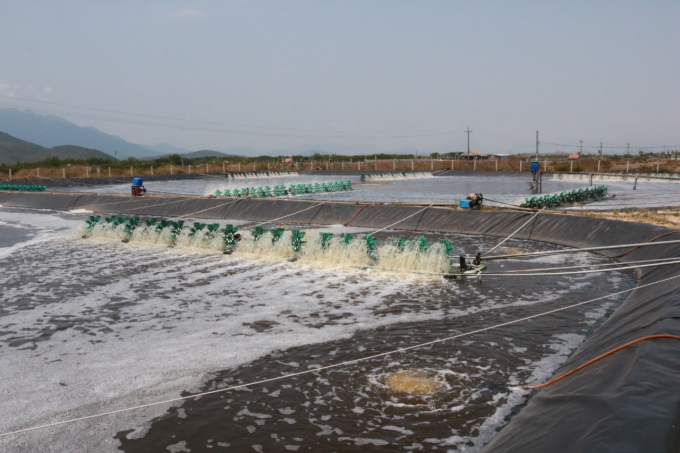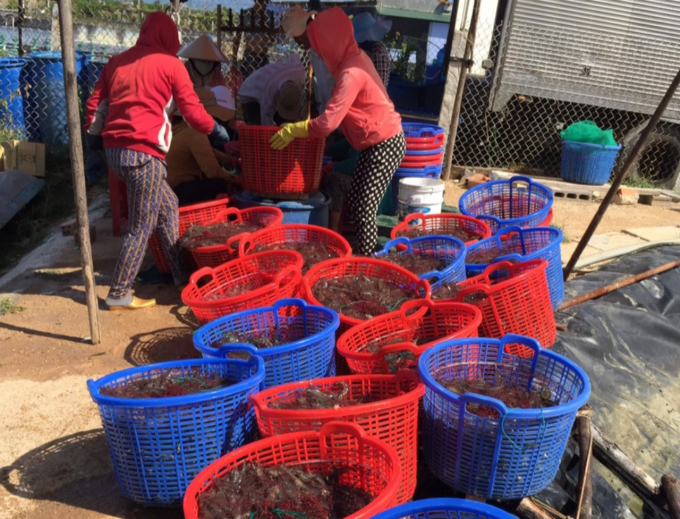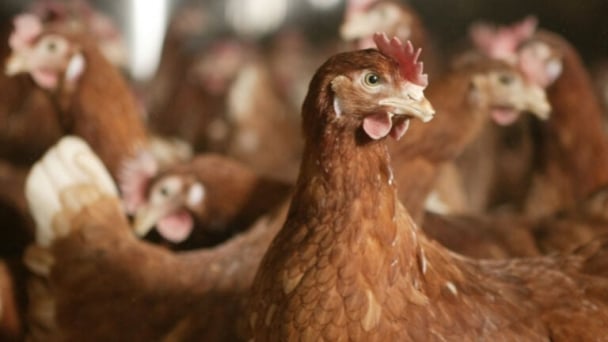June 25, 2025 | 13:09 GMT +7
June 25, 2025 | 13:09 GMT +7
Hotline: 0913.378.918
June 25, 2025 | 13:09 GMT +7
Hotline: 0913.378.918
A plan to effectively prevent and control a number of dangerous diseases on aquaculture in the period 2021 – 2030 has been issued by Binh Thuan Province.
Specifically, the People's Committee of Binh Thuan Province assigns the provincial Department of Agriculture and Rural Development to direct specialised organisations and coordinate with relevant departments and People’s Committees to take proactive measures, thereby timely detecting, preventing and controlling effectively dangerous diseases in aquaculture.

Binh Thuan Province has issued a plan to effectively prevent and control a number of dangerous aquatic diseases. Photo: KS.
According to Binh Thuan Provincial People's Committee, the specific goal of the above plan is to proactively prevent and control dangerous diseases in brackish water shrimp, ensuring that the infected area is less than 10% of the total farming area.
The plan also aims to proactively prevent and control some dangerous diseases in lobsters, ensuring that the number of infected lobsters is less than 15% of the total farming area, in addition to proactively prevent, detect and control a number of dangerous diseases on other farmed aquatic animals, preventing pathogens from spreading.
Additionally, it is expected to effectively prevent a number of dangerous emerging exotic pathogens that might enter Vietnam. At the same time, a number of disease-free establishments and production chains have been built, first of which are large-scale shrimp seed production and commercial shrimp farming enterprises, following regulations of the World Organization for Animal Health (OIE) and the Ministry of Agriculture and Rural Development to serve both domestic consumption and promote shrimp exports.
To achieve aforementioned goals, it is necessary to concentrate and mobilize resources to actively prevent, proactively monitor, timely detect and effectively control dangerous diseases on farmed aquatic products that are prioritised in this plan.
Technical procedures for disease prevention and control will be applied within Binh Thuan Province. Specifically, aquaculture production facilities must comply with regulations on conditions of rearing facilities, wastewater treatment or stocking season.
They also need to ensure that the quality of seed is quarantined according to regulations; apply the technical process of raising and managing breeding stock and pond; apply supportive measures to improve the resistance of farmed aquatic animals to reduce the risk of contracting diseases.
The plan also suggests applying measures to prevent diseases and handle the epidemic outbreaks under the guidance of specialized veterinary agencies; periodically inspecting ponds, lakes, cages and rafts for aquaculture; handling animals that transmit diseases; collecting samples for testing in case of suspected epidemic arising; handling aquatic animals suspected of being infected, infected or dead; cleaning, disinfecting and applying measures to treat ponds, cages, aquaculture rafts, water environment, food, vehicles and tools used in the farming process.

A number of disease-free aquaculture areas to serve domestic consumers and export will be built in Binh Thuan Province. Photo: KS.
Vaccines should be considered and used to actively prevent diseases for aquatic animals to minimize the use of antibiotics and prevent drug resistance in aquaculture.
Meanwhile, local authorities must regularly examine aquaculture establishments. In case of detecting aquatic animals with abnormal signs or suspected of having diseases, samples and tests must be taken to identify pathogens and environmental monitoring parameters.
Authorised organisations must organise epidemiological investigations and guide farmers to apply integrated treatment measures as prescribed to effectively prevent the disease from spreading.
The plan also mentions that the local authority must actively supervise seed production facilities, areas, and commercial farming establishments; develop and implement sampling plans, organize testing of dangerous pathogens on aquatic products; organize epidemiological investigation and provide guidance on measures to eliminate pathogens in case the test sample is positive for dangerous pathogens...
Another measure is controlling, preventing, detecting and strictly handling cases of illegal transportation and trade of aquatic animals and aquatic animal products in the country and from abroad into Vietnam.

(VAN) Research has shown that Hy-Line brown hens may be better suited for cage-free production based on overall greater egg production and other quality metrics.
![Turning wind and rain into action: [9] Digitizing hydrometeorological data in response to climate change](https://t.ex-cdn.com/nongnghiepmoitruong.vn/608w/files/news/2025/06/17/z6704423696987_15fd32ffc26d590d204d520c9dac6786-nongnghiep-165943.jpg)
(VAN) Farmers have begun accessing hydrometeorological applications to adjust their cropping schedules, aiming to ensure productivity and adapt to climate change.
![Turning wind and rain into action: [8] Real-time salinity detection and early warning technology](https://t.ex-cdn.com/nongnghiepmoitruong.vn/608w/files/news/2025/06/17/z6704423696987_15fd32ffc26d590d204d520c9dac6786-nongnghiep-151127.jpg)
(VAN) Thanks to the integration of modern hydrological-hydraulic models, remote sensing technologies, and artificial intelligence, the accuracy of hydrological forecasting has significantly improved.
![Turning wind and rain into action: [7] Early disaster warnings help marine farmers minimize losses](https://t.ex-cdn.com/nongnghiepmoitruong.vn/608w/files/news/2025/06/17/z6704423696987_15fd32ffc26d590d204d520c9dac6786-nongnghiep-142942.jpg)
(VAN) In recent years, thanks to early disaster warnings and forecasting, marine farmers in Khanh Hoa province have been able to reduce risks and losses, thereby improving production efficiency.
![Turning wind and rain into action: [6] ‘Four on-the-spot’ disaster management software](https://t.ex-cdn.com/nongnghiepmoitruong.vn/608w/files/news/2025/06/17/e5a48259d6a262fc3bb3-nongnghiep-183800.jpg)
(VAN) By simply activating the scenario on the disaster management software, the relevant authorities immediately know how many households need to be evacuated, where to evacuate them to, and by what means of transportation…
![Turning wind and rain into action: [5] Hue applies modern technology in disaster forecasting](https://t.ex-cdn.com/nongnghiepmoitruong.vn/608w/files/news/2025/06/17/z6704423696987_15fd32ffc26d590d204d520c9dac6786-nongnghiep-093938.jpg)
(VAN) In Hue city, modern technology has recently been applied in meteorological and hydrological forecasting and warning, helping to reduce the damage caused by natural disasters.

(VAN) A cutting-edge farming technique being implemented on an experimental ranch in Arizona's Sonoran Desert has already saved a billion gallons of water over five years, according to Civil Eats.